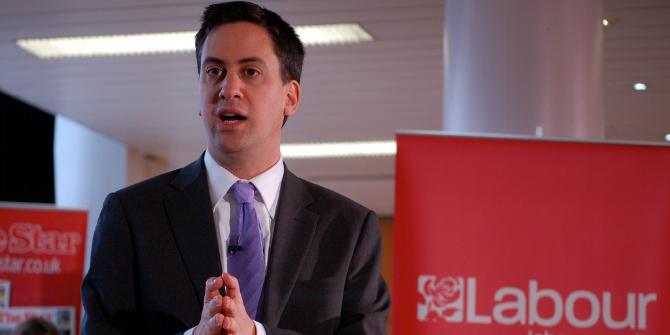 Last week, Ed Miliband announced that a Labour government would cut university tuition fees from £9000 to £6000 a year. In this post, Steve Fisher examines the initial public response to this announcement. He suggests that, so far, while the policy is popular, it is unlikely to win Labour many new votes at the approaching election.
Last week, Ed Miliband announced that a Labour government would cut university tuition fees from £9000 to £6000 a year. In this post, Steve Fisher examines the initial public response to this announcement. He suggests that, so far, while the policy is popular, it is unlikely to win Labour many new votes at the approaching election.
In December the Higher Education Policy Institute (HEPI) published a report I co-authored showing that the student vote seemed to respond to the changing pattern of generosity of party policies on higher education funding since 1997. Most notably in 2001, 2005, and 2010 the Liberal Democrats did particularly well among students by offering the most generous package.
But this does not mean that Labour will reap big rewards for their recent promise.
As the report shows, in 2005 students primarily punished Labour for an apparent breach of promise on top-up fees, but the Tories did not benefit from joining the Liberal Democrats in promising to scrap tuition fees. Labour have already benefited considerably from students deserting the Liberal Democrats following the breach of their 2010 pledge on tuition fees. It is not clear there is much scope for them to benefit further on the issue.
The main challenge facing Labour’s student vote now is the Green surge. Some recent surveys suggest around a 10 point swing from Labour to the Greens among students since early 2014. It is hard for Labour to compete on generosity with the Green policy of abolishing fees and reintroducing grants (ED234). But, students who prefer the Greens might now be more likely to vote tactically for Labour.
As an election strategy, it is not clear that the student vote is worth chasing anyway. The new Individual Electoral Registration (IER) system seems to have led to serious under registration of students (e.g. see here, here, and here). Most recently Jack Blumenau, Simon Hix and Tony Travers have shown that electoral registration numbers dropped most heavily between December 2013 and December 2014 in constituencies with large proportions of students in university halls of residence.
Students have previously had lower turnout than other electors even when registered. There are now also indications that students are more likely to be registered at their home rather than their university address, perhaps raising the risk of low turnout at what will be a term time election.
Nonetheless the HEPI report showed that there are up to a dozen seats where it looks like differential swing among students might affect the outcome. Also the constituency data suggest that the effects of IER on student registration are enough to sway some seats.
All that said, the reaction of non-students will probably have greater electoral implications than the student response to the fee cut promise.
Increasing tuition fees was hugely unpopular in late 2010 even though people were more accepting of the principle of students paying the bulk of the costs of their education. Recent YouGov data shows the public are still evenly divided on the extent to which the costs of university education should be paid for by general taxation or by students.
In December YouGov also found that 62% thought that tuition fees of up to £9000 were “not value for money – the standard of education and the wages graduates earn are not enough to warrant the cost.” Also when faced with a choice, 54% supported “lower tuition fees and less money for universities” and just 21% were opposed.
Earlier this week, YouGov respondents were asked whether they supported or opposed the Labour party’s proposal. Overall 49% supported and 31% opposed.
Whereas in December there was relatively little variation in support for fee reduction by socio-demographics or by past or current vote intention, responses to the Labour party proposal are much more structured. In December, 46% of 2010 Conservative voters supported a fee reduction compared with 59% each of Labour and Liberal Democrat voters. Now, just 25% of 2010 Conservatives support Labour’s proposal compared with 68% of former Labour voters and 57% of 2010 Liberal Democrats.
This seems to be a classic example of policy evaluations depending on party attributions. Plenty of Tories liked the policy before it was associated with the Labour party but not any more. Conversely Labour supporters like it more when told the policy comes from their party.
In truth the two policies asked about are not perfectly the same and there has been some debate about how Labour’s plans would help better off graduates more. This is a feature that YouGov respondents seem to have noticed, with 2010 Conservative and Liberal Democrat voters marginally more aware of it than are 2010 Labour voters. But this pattern does not account for the much bigger gaps between voters for different parties in their support for the policy overall.
The party differentials in support suggest the policy announcement will not win over many voters for Labour. While the policy is popular among those already intending to vote Labour (78%), only 21% of Conservatives and 34% of current UKIP voters support it. Despite Ed Davey and Vince Cable arguing against the policy, still 57% of current Liberal Democrats support it. But there are not many such voters left for Labour to win over and Liberal Democrat seat loses disproportionately help the Tories. (There is no information on Green voters in the tables, but they might matter too.)
It is still just four days from the policy announcement, so it remains to be seen whether the fee reduction promise will entice more people to vote Labour, or whether accusations of fiscal responsibility from the Conservatives and Liberal Democrats will prove damaging, or neither. All three of yesterday’s polls showed swings from Labour to the Conservatives, but all well within the expected margin of error.
Note: This is an updated and extended version of a post on electionsetc.com on 27th February 2015. The author thanks Nick Hillman for comments on an early draft.
Steve Fisher is an Associate Professor in Political Sociology and the Fellow and Tutor in Politics at Trinity College, University of Oxford. He is also one half of the team at electionsetc.com.








1 Comments